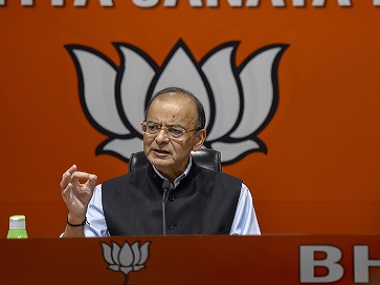Former finance minister Arun Jaitley, 66, was admitted to the cardio-neuro department of Delhi’s AIIMS on Friday morning after he complained of breathing difficulties. He is currently in the intensive care unit (ICU) and a team of cardiologists (heart specialists), endocrinologists (endocrine glands specialists) and nephrologists (kidney specialists) are looking after him. In a press release on Friday, his doctors had said that he is haemodynamically stable — a term that in medical parlance means that his heart rate and blood circulation are under manageable levels. The London Health Sciences Centre, Canada, defines haemodynamically stable as “someone whose condition is unchanged” whether they are completely healthy or critically ill. Jaitley has been suffering from multiple health conditions, including diabetes and high blood pressure. He underwent bariatric surgery in September 2014 to lose excess weight. He also had a kidney transplant in May 2018 — diabetic nephropathy or kidney damage is one of the most common conditions, affecting about 40 percent of diabetic patients. [caption id=“attachment_6352131” align=“alignleft” width=“380”] File photo of Arun Jaitley. PTI[/caption] Earlier this year, Jaitley also underwent treatment for soft cell sarcoma — a type of cancer that affects soft tissues of the body, including fat, muscles and blood vessels. According to an article published in Nature Reviews. Nephrology, a peer-reviewed journal, kidney transplant patients are twice as likely to develop cancer than people with healthy kidneys. Cancer treatment affects the body’s ability to heal wounds and repair damage, according to the American Cancer Society — of course not everyone has all the side effects of cancer treatment and their severity depends on the drugs and treatment modality used. Experts say that more people are getting multiple health conditions now than ever before. They call it “multimorbidity” — a more democratic term for the earlier “comorbidity” which was based on the idea that one primary disease leads to several related conditions. Ironically, technological advancements, public health policies and medical services have been blamed for the emergence of multimorbidity. Multimorbidity, or the coexistence of multiple health conditions, makes it really difficult to treat the person. This is because these patients have to take multiple treatments for different conditions, and the risks of drug interactions and side effects increase. “Because various body systems are involved, care for multiple diseases becomes really tricky. Especially when it includes vital organs like the heart, kidneys, lungs and brain," said Dr Shahnaz, a medical practitioner associated with myUpchar.com. “Treatment usually depends on the severity of the condition. A multidisciplinary team is usually called in to handle these cases at a tertiary care hospital,” she added. In a study published in the Journal of Family Medicine and Primary Care, Rajnish Joshi, a doctor at AIIMS Bhopal, suggested that about two-thirds of patients with chronic disease suffer from multiple conditions in India — most of them have diseases such as high blood pressure or diabetes in common. Dr Joshi recommends the development of a treatment programme based on disease axis (instead of a disease-specific), with a guideline for the most prevalent conditions like high blood pressure, diabetes, obesity, and on the prevention of the secondary complications of all of these conditions, under a single umbrella. This article was created by myUpchar, India’s first and biggest online resource for verified medical information. For more in-depth information on all things health, please visit
www.myupchar.com/en_._ For more details on this topic, please see:
https://www.myupchar.com/en/disease/diabetes
Multimorbidity, or the coexistence of multiple health conditions, makes it really difficult to treat the person. This is because these patients have to take multiple treatments for different conditions, and the risks of drug interactions and side effects increase.
Advertisement
End of Article


)

)
)
)
)
)
)
)
)



